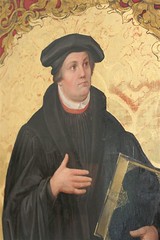Martin Luther (10 November 1483 – 18 February 1546) initiated the Protestant Reformation, says Wikipedia.[1]
As a priest and theology professor, he confronted indulgence salesman Johann Tetzel with his The Ninety-Five Theses in 1517. Luther strongly disputed the claim that freedom from God's punishment of sin could be purchased with money.
His refusal to retract all of his writings at the demand of Pope Leo X in 1520 and the Holy Roman Emperor Charles V at the Edict of Worms meeting in 1521 resulted in his excommunication by the pope and condemnation as an outlaw by the emperor.
Martin Luther taught that salvation is not from good works, but a free gift of God, received only by grace through faith in Jesus as redeemer from sin. His theology challenged the authority of the pope of the Roman Catholic Church by teaching that the Bible is the only source of divinely revealed knowledge[2] and opposed sacerdotalism by considering all baptised Christians to be a holy priesthood.[3]
His translation of the Bible into the language of the people (instead of Latin) made it more accessible, causing a tremendous impact on the church and on German culture. It fostered the development of a standard version of the German language, added several principles to the art of translation,[4] and influenced the translation into English of the King James Bible.[5] His hymns inspired the development of singing in churches.[6] His marriage to Katharina von Bora set a model for the practice of clerical marriage, allowing Protestant priests to marry.[7]
Luther was a prolific hymn writer, authoring hymns such as "A Mighty Fortress is Our God."[126] Luther opened the way for a bringing together of high art and folk music, of all classes, clergy and laity, men, women and children. His device for this linking was the singing of German hymns in connection with worship, the school, the home, and the public arena.[127]
He is associated with the use of Christmas trees in the home, as well as candles on the tree.
Indie work:
Compare the life of TE Lawrence to that of Martin Luther.
skip to main |
skip to sidebar
For students and parents who love education and exploration of the social sciences . . .
Search This Blog
Followers
Blog Archive
-
▼
2009
(379)
-
▼
December
(33)
- 2010: Year of the tiger
- Andrew C Revkin, NY Times science reporter, blogge...
- Copenhagen World Climate Change Conference opening...
- Cars of the World presentation . . .
- Intro to Deutschland
- Major parts of the British Empire
- The ancient, universal and positive nature of the ...
- British Empire presentation
- Semester book report due Mon, Dec 14: 15 pts and 1...
- Semester exam in geography: 100 multiple-choice qu...
- At Xmas we remember the courageous German priest a...
- The Yucatan to Venezuela / the Caribbean quiz
- The Greater and Lesser Antilles quiz
- Lawrence of Arabia: after Aqaba / quiz 2
- Lawrence of Arabia quiz 1; from Britain to Arabia
- Aqaba
- Inspiration for the Artful map project: antique maps
- Lawrence of Arabia study guide - answers to 26 - 60.
- Artful, matted map project due Th, Dec 17
- Drilling Rig, hydraulic fracturing and the environ...
- Map of Silk Road
- Lawrence of Arabia-related vocab
- St. Constantine the Great and the Christiqan churc...
- Notes on Israel / Palestine and the conflict with ...
- Burj Dubai: world's tallest building in financial ...
- Polygamy, women and Islam
- Friday is Boot video day
- Magnet Semester Exam Schedule Jan 6 - 8, 2010
- History and traditional Arabic coffee
- Traditional garb of people in the regions surround...
- Lawrence of Arabia (1962) guide / answers
- British view of the Bedouins, 1915: tribe against ...
- SW ASia / Middle East map quiz Thurs
-
▼
December
(33)

